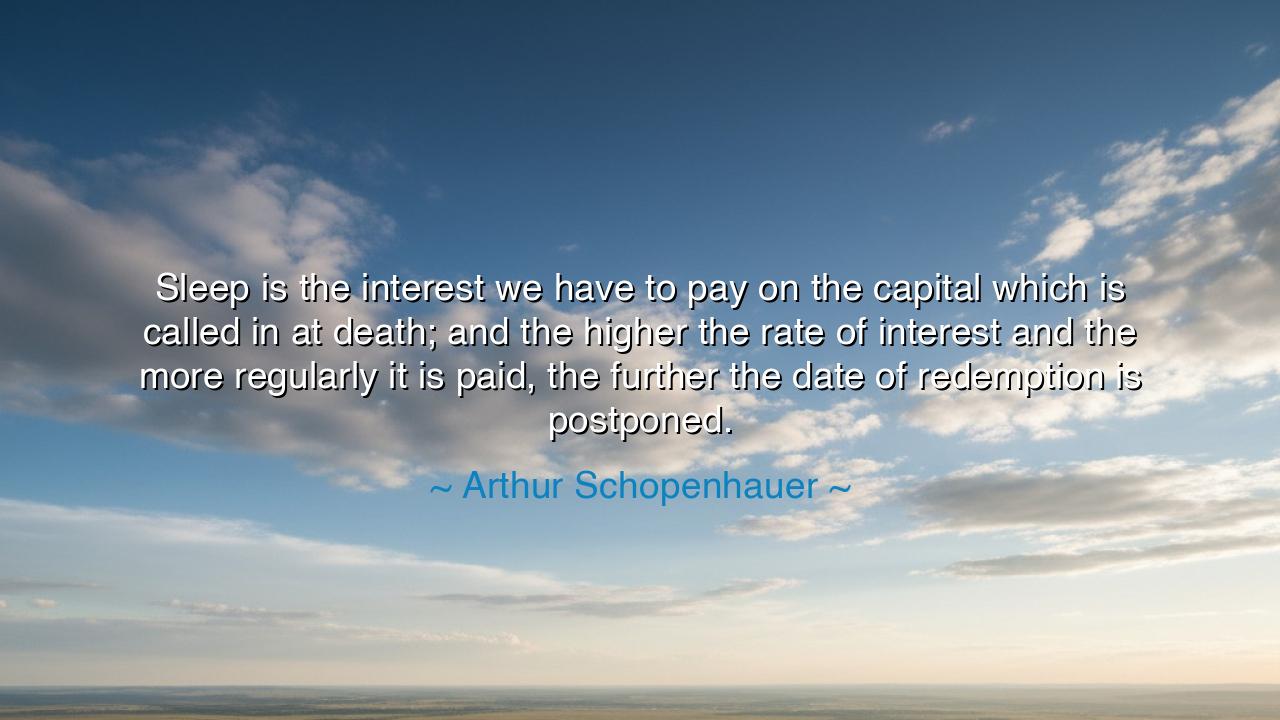
Sleep is the interest we have to pay on the capital which is
Sleep is the interest we have to pay on the capital which is called in at death; and the higher the rate of interest and the more regularly it is paid, the further the date of redemption is postponed.






“Sleep is the interest we have to pay on the capital which is called in at death; and the higher the rate of interest and the more regularly it is paid, the further the date of redemption is postponed.” — so wrote Arthur Schopenhauer, the philosopher who gazed deep into the shadowed chambers of existence. In these words, he wove together the mysteries of life, sleep, and death into a single, haunting metaphor. To him, life is a loan granted by nature — a capital that we must one day repay. But sleep, that gentle surrender to darkness, is the interest we pay to prolong our time before the final reckoning. It is both a debt and a blessing — the daily rehearsal for eternity.
The ancients, too, understood this sacred exchange. They called sleep “the brother of death,” not as a curse, but as a sign of kinship between the two. For in sleep, our senses withdraw, our thoughts dissolve, and our spirit rests in stillness — a faint echo of the great silence that awaits us all. Schopenhauer’s insight is not merely poetic; it is a profound recognition of life’s fragile balance. He teaches that to live well, one must respect rest, for the body and soul are bound by laws as old as time itself. Just as a fire burns brighter when allowed to breathe, so too does life endure longer when given its nightly peace.
Consider the story of Leonardo da Vinci, whose brilliance illuminated the world like dawn breaking over the earth. Yet even the master, who labored through the night in pursuit of invention and art, understood the price of sleeplessness. His later years were marked by exhaustion, his mind overtaxed by endless striving. Had he given his body the rest it deserved — the interest payment Schopenhauer speaks of — his genius might have shone still longer. Thus, even the greatest minds must bend before the simple wisdom of nature: those who do not pay their debt to rest will have their capital called in too soon.
In these words lies not only warning but harmony. Sleep is not an enemy of ambition; it is its guardian. It gathers the scattered energies of the day, mends the weary spirit, and renews the heart’s strength. The philosopher’s metaphor reminds us that life is no sprint to be won through exhaustion, but a long voyage sustained by balance. To deny sleep is to rob tomorrow for the sake of today, to borrow against one’s own vitality until the soul itself grows poor. Every hour of rest, then, is an offering to the temple of endurance.
But beyond the physical, Schopenhauer’s wisdom also touches the spiritual realm. For in sleep, the mind is freed from the tyranny of the waking world. It drifts into dreams, those shadowed realms where the soul communes with mystery and memory. There, we encounter echoes of eternity — faces long gone, moments unborn. Sleep reminds us that death itself is not to be feared, for each night we die a little and are born anew with the rising sun. Thus, the rhythm of rest and waking is the soul’s rehearsal for the grand cycle of life and death.
To the wise, this teaching is both humbling and empowering. It teaches that care for the self is not indulgence but reverence — a duty to the divine spark within. The warrior who trains without rest dulls his blade; the thinker who studies without pause dulls his mind. Only by honoring both action and restoration can one walk the long path with grace. The ancients practiced this balance: farmers who rose with the dawn, poets who sought dreams as eagerly as waking thoughts, healers who saw rest as medicine of the spirit.
So, my child, remember this: your body is the vessel of your soul, and sleep is the tide that keeps it afloat. Do not fight the coming of night, but welcome it as a teacher. Pay the interest gladly — in full, and with gratitude. Walk gently into your hours of rest, knowing that in them you preserve the days yet to come. Rise each morning not as one escaping darkness, but as one who has returned from a sacred pilgrimage to the still heart of life.
For as Schopenhauer taught, the more faithfully we pay the interest of sleep, the longer we hold the treasure of life. To live wisely, then, is to live rhythmically — to work fiercely, to rest deeply, and to meet each dawn as both debtor and heir of time itself.






AAdministratorAdministrator
Welcome, honored guests. Please leave a comment, we will respond soon